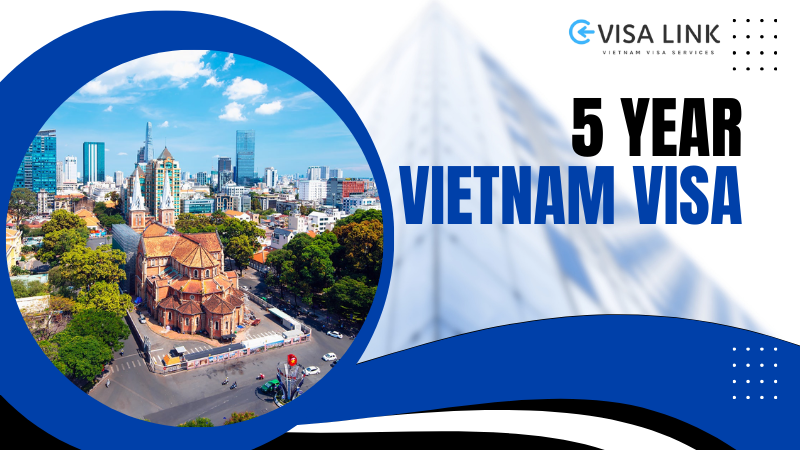5-Year Vietnam Visa Exemption – Comprehensive Requirements and Guide
The 5 year Vietnam Visa marks a pivotal step in Vietnam’s travel and immigration policies, reflecting a commitment to deepening international ties. As Vietnam emerges as a beloved destination for its unique culture and stunning landscapes, there’s a growing demand for extended stay options. The “5-Year Vietnam Visa” caters not only to overseas Vietnamese wishing to reconnect with their roots but also opens doors for foreign investors and professionals. This visa is a testament to Vietnam’s forward-thinking approach, seamlessly blending its rich heritage with global aspirations.
Understanding the 5-Year Vietnam Visa Eligibility
The 5-year Vietnam visa exemption application form is a crucial first step towards obtaining the Vietnam 5-Year Visa. Contrary to its name, this isn’t a typical visa. Instead, it’s an exemption certificate that functions as a long-term multi-entry ticket to Vietnam. So, who’s the ideal candidate for this unique document? Let’s dive deeper:
- Vietnamese Overseas: Tailored primarily for the Vietnamese diaspora, this exemption echoes the profound ties overseas Vietnamese have with their motherland. It beckons them to return, rediscover, and rekindle their roots.
- Family Ties: This visa exemption extends its arms to foreigners related to Vietnamese citizens or the diaspora either through marriage or lineage. Such a gesture promotes familial unity, simplifying the process of family reunions, bypassing the red tape usually linked with extended visits.
- Duration and Flexibility: Those with this certificate in hand can journey into Vietnam time and again, enjoying stays spanning up to 180 days at a stretch. Its multi-entry trait paves the way for both impromptu and extended visits. And if you’re looking to prolong your stay beyond 180 days without exiting Vietnam? There’s room for that too – a visa extension valid for another 6 months is up for grabs.
- Validity Tied to Passport: One can’t afford to overlook the fact that the certificate’s lifespan is intrinsically linked to one’s passport. While it stands valid for a maximum of 5 years, it needs to terminate at least half a year prior to the passport’s expiry. This mechanism ensures every piece of your travel documentation remains valid and updated throughout your Vietnamese sojourns.
Guide to Acquiring the 5 Year Vietnam Visa Exemption
Navigating visa processes, including the intricacies of the Vietnam exit visa, can be complex. However, Vietnam’s 5-year visa exemption program simplifies the journey for certain applicants. Here’s a structured breakdown of the steps, including the 5-year Vietnam visa cost details for comprehensive understanding.
Step 1: Assembling Essential Documents
Vietnamese Overseas:
- Fill in the designated exemption application form online.
- Possess a valid passport and provide two recent photos.
- Attach documentation authenticating Vietnamese origin, or, in its absence, a guarantee from an overseas Vietnamese association.
Foreign Relatives of Vietnamese:
- Use the standard exemption application form (specific forms are available based on your current location, either inside or outside Vietnam).
- Add a valid passport, two fresh photos, and paperwork that verifies the relationship to an overseas Vietnamese or a Vietnamese national.
Step 2: Forwarding Your Application
Choose the appropriate authority based on your current location:
- Vietnamese consulates or diplomatic missions abroad.
- The Vietnam Immigration Department, if you’re already in Vietnam.
Step 3: Retrieving Your Documents
Once approved, you can collect your original passport along with the sought-after 5-year visa exemption certificate.
Deciphering the 5-Year Vietnam Visa exemption costs
The path to acquiring the 5-year visa exemption for Vietnam comes with its financial considerations. While the exemption’s benefits are clear, applicants should also be well-versed in the associated fees, including the Vietnam 5-year visa fee. Here’s a concise overview:
- Authority-Dependent Fees: The agency or institution through which you channel your application holds sway over the primary fee structure. Whether it’s a Vietnamese consulate stationed overseas or the central Vietnam Immigration Department, each has its pricing system. Some might offer premium services at an elevated price, while others incorporate charges for the value-added guidance they render.
- Delivery Charges: A critical aspect often overlooked is the delivery fee for the certificate. If you’re residing overseas or in a location distant from the processing center, postal or courier fees can be substantial. Naturally, opting for swift international shipping methods will dent your wallet more than standard delivery. Furthermore, delivery to out-of-the-way locales can bring about extra costs.
Pros and Cons of the 5-Year Vietnam Visa Exemption
The “5-Year Vietnam Visa Exemption Certificate”, including the Vietnam 5 years visa exemption for Australia, has dramatically changed the landscape of travel to Vietnam, especially for long-term visitors. But like any policy, including the Vietnam visa extension options, it comes with its set of advantages and potential concerns. Let’s dissect them:
Advantages
- Extended Stays: The most significant perk is the lengthy 180-day stay permitted on each visit. Traditional visas often grant much shorter durations, making this exemption a boon for long-term tourists, business travelers, or those visiting family.
- Repetitive Visits: Over the span of 5 years, travelers can make multiple entries into Vietnam without the hassle of recurrent visa applications. This is incredibly convenient for frequent travelers.
- Cost-Efficiency: In the long run, holding this exemption certificate might prove more economical. Considering the cumulative cost of multiple short-term visas over 5 years, this one-time certificate could offer significant savings.
Points of Concern
- Stay Limitations: Despite the generous 180-day allowance, some visitors might wish to stay continuously for longer durations. In such cases, they need to apply for a visa extension within Vietnam, adding an extra layer of bureaucracy.
- Eligibility Restrictions: This exemption isn’t universally available. It’s primarily for overseas Vietnamese and their close families, potentially excluding a large segment of international travelers.
- Validity Tied to Passport: The exemption’s expiration is dependent on the holder’s passport validity. If a passport expires, the certificate becomes invalid even if its 5-year tenure hasn’t concluded. This requires careful planning and possibly early passport renewals.
Wrapping Up
The 5-Year Vietnam Visa Exemption Certificate is a remarkable tool for those frequently visiting Vietnam, offering extended stays and reduced bureaucratic hassles. However, it’s essential to be mindful of its intricacies. If you’re pondering over how to apply for a Vietnam visa for 5 years, ensure you’re familiar with its linkage to your passport’s validity and consider the long-term cost benefits. If you’re overwhelmed by the process, remember that professional help is available. In essence, this exemption can make your Vietnamese visits smoother, but understanding and foresight are key. Safe travels to Vietnam!


